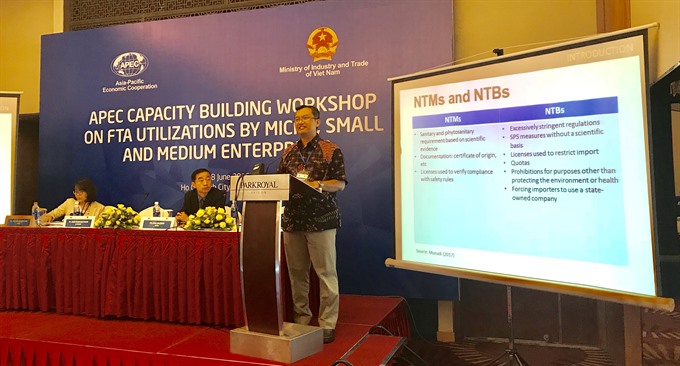Trade facilitation, partnerships and capacity-building activities are needed for Micro, Small and Medium Enterprises (MSMEs) in APEC-member economies so they can take advantage of Free Trade Agreements (FTAs), speakers said at a workshop held on June 7 in HCM City.

Trade facilitation, partnerships and capacity-building activities are needed for Micro, Small and Medium Enterprises (MSMEs) in APEC-member economies so they can take advantage of Free Trade Agreements (FTAs), speakers said at a workshop held on June 7 in HCM City.
Pham Quynh Mai, deputy general director of the Ministry of Industry and Trade’s Multilateral Trade Policy Department, said MSMEs were the engines of growth and innovation in the APEC region.
MSMEs account for over 97 per cent of all enterprises and employ over half of the workforce across APEC economies, she said.
They contribute significantly to economic growth, with MSMEs’ share of GDP ranging from 20 per cent to 50 per cent in most APEC economies.
However, only a limited percentage of MSMEs engage in overseas activities due to limited awareness of how to take advantage of FTAs and join regional and global supply chains, she added.
In that context, one of the key pillars under an APEC initiative is improving knowledge sharing about trade facilitation, business support, partnerships, and capacity-building activities for MSMEs, according to Mai.
MSMEs need to study inclusive business models, examples of successful export MSMEs, and lessons extracted from successful experiences in internationalisation and cooperation among economies.
Viet Nam can benefit from its strategic geographical location in a dynamic Asia-Pacific region and its proximity to global manufacturing value chains, speakers said.
Sixty-five per cent of the country’s population is under 35 years old, and there are also affordable labour costs as well as an emerging middle class.
However, experts also warned that costs and risks of international integration could be significant for Vietnamese MSMEs, and as such, improving the overall business environment continues to be key.
Viet Nam has committed to further institutional and structural reforms to help MSMEs, Mai said.
Dr Rajan Sudesh Ratna, economic affairs officer at the UN’s Economic and Social Commission for Asia and the Pacific, said FTAs provided MSMEs with access to markets, creating value chains, bringing in FDI inflow and technologies, reducing trade costs, and enhancing linkages among industries.
“FTAs also provide technical assistance, capacity building and assist FTA member economies in improving their overall capacity to benefit from trade, harmonising procedures and rules of different agreements among common economies,” he said.
Regarding the Rule of Origin (ROO) in FTAs, Naoya Sumimoto, customs specialist at the Tokyo Kyoto Accounting Office, said the ROO identifies where the exported goods originated.
“ROO is crucial to determine whether or not the exported goods are qualified for preferential tariffs under specific FTAs or Economic Partnership Agreements,” he said.
The workshop also discussed trade in services, including issues such as market access, schedules of commitments, and most favoured nation (MFN) treatment in addition to intellectual property and competition.
On June 8, the workshop will continue with a discussion about successful uses of FTAs by APEC member economies.
The outcomes of the workshop will be reported to the APEC SME Working Group for consideration and will serve as input for the working group to develop action plans to facilitate MSMEs’ integration in global value chains.
Last year, leaders of 21 APEC-member economies met in Da Nang to discuss ways to promote regional trade agreements and move towards the realisation of a Free Trade Area in the Asia-Pacific region. — VNS





